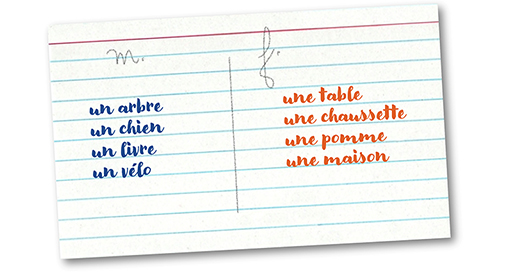4 Memorising nouns and their gender
Think about how you might memorise masculine and feminine nouns. Some people like to colour-code their written vocabulary notes. Others learn sentences using the noun. Although you will not necessarily be misunderstood if you make a mistake with gender, it is nevertheless important to get to grips with this challenge early on; the more you repeat words and become familiar with them, the more likely you are to remember gender without much effort.
As well as these tips, you will start to notice patterns as you build up your knowledge of vocabulary. For example, most nouns ending in -ion (you may remember the work you did with cognates in Week 2) are feminine, for example la télévision, la présentation,and l’organisation. Most nouns ending in -age are masculine, for example le garage and le montage. And most ‘loan words’ from English to French are also masculine, for example le weekend, le marketing, and le web. It is always useful to spot patterns when learning a language, and you will feel more empowered to use your new skills if you have a reliable base of rules (even though there are inevitably exceptions to them).
Now, it’s time to turn to verbs.

